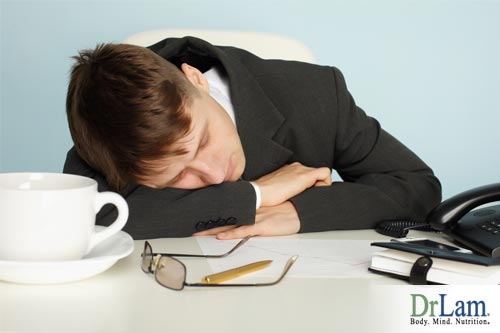
Caffeine is a naturally occurring compound, but its prevalence in today’s society is so widespread that its consumption in mass quantities has become commonplace. About 90 percent of the US population consumes caffeine on a regular basis, a stimulant that has been taken since time immemorial. In fact, it can be considered “antisocial” if a cup of coffee is not in your hand as the day begins.
High dose caffeine consumption has become the source of a much needed “boost” when our bodies get low on energy. It is a socially acceptable form of addiction. Most experts say that taking caffeine in moderation is fine for healthy adults. However, people are influenced by caffeine in many different ways. While it may work as a short-term fix, all of this caffeine can do even more to harm a fatigued adrenal system which could, in turn, lead to more tiredness or a caffeine crash along with other complications. As common as these caffeine sources are and as much as they proliferate our home and work environments, it’s essential to consume them with care. Numerous studies suggest that caffeine can increase blood pressure and heart rate, while increasing feelings of anxiety, stress, and even road rage. Too much caffeine, over too long of a period of time, can cause dangerous issues.
 Caffeine is the most consumed psychoactive substance. When you take caffeine, it produces positive effects on your mood and alertness, and many people favor these effects.
Caffeine is the most consumed psychoactive substance. When you take caffeine, it produces positive effects on your mood and alertness, and many people favor these effects.
Although many people depend on coffee for a quick jolt, more and more studies reveal other benefits of caffeine such as enhanced memory, improved liver health, and better athletic performance. Studies revealed that caffeine has the potential to slow Parkinson’s disease. Other people have reported feeling less hungry when consuming caffeine, although only a few would consider it a weight loss aid.
With all these caffeine benefits, when is too much? And if necessary, what is the best way to cut caffeine consumption?
When working with clients, we always take into account their overall health and lifestyle before assessing whether something is good or bad. Many things, like caffeine, can be beneficial in one context and not in another. It’s rarely ever clear-cut.
A research compilation review looked at the side effects associated with consuming too much caffeine such as general toxicity, behavioral effects, developmental and reproductive effects, cardiovascular effects, and effects on calcium absorption and bones. This systematic review evaluated caffeine consumption from any source.
Researchers concluded that a healthy adult can safely consume up to 400 mg of caffeine every day, which is equivalent to about 4 8-ounce cups of brewed coffee. A cup of brewed coffee can contain 75 to 200 mg of caffeine, depending on the source.
When it comes to pregnant women, the amount of caffeine is particularly important. Although the research allows up to 300 mg of caffeine per day, the American College of Obstetricians and Gynecologists advises expectant moms to limit caffeine to 200 mg. Caffeine is rapidly absorbed by the body and can cross the placenta, which may influence blood flow in the placenta and affect fetal growth.
Children and adolescents’ caffeine intake should not go beyond 2.5 mg of caffeine per kilogram of body weight per day. So for a child who weighs 55 pounds, this means a daily intake of 62.5 mg of caffeine max.
Although the recommendations for caffeine intake are based on particular amounts, the effects may differ from person to person. Caffeine tolerance is highly individual. Many people take caffeine without experiencing any negative effects, but for some, having too much can cause distress.
A person’s caffeine tolerance may depend on body weight and how they break down caffeine. Some metabolize it quickly, so they are less likely experience any negative effects. Lifestyle factors may influence caffeine metabolism as well. Use of oral contraceptives and pregnancy can slow down caffeine metabolism.
Caffeine is so entrenched in our daily lives that we don’t see it as a cause of potential health problems. Research shows that the majority of Americans still consume less than 400mg of caffeine, and the more potent effects of caffeine are usually only observed at much higher doses. However, not all people experience the same effect. It is important to understand that it has psychoactive effects, so it may interfere in ways you don’t expect.
For some of us, it's hard to imagine functioning at all without caffeine. Common coffees and teas have up to 15% caffeine, while energy drinks can pack double the caffeine as coffee in the same volume. The amount of caffeine in a cup of coffee can range from 70-200 mg. Energy drinks are even worse. Many depend on these caffeine sources to get through the day. No matter when or how you consume it, caffeine has the same stimulant effect on the heart and the adrenal glands.
When it is fatigued, the body is at its weakest point. This is when the body should be nurtured and rested. Just as you wouldn’t continue to work a horse that has become fatigued in the hope that it will rebound, the body must also be rested in order to return to full function once again. Caffeine can stimulate the body, but it does nothing to deal with what’s actually causing the tiredness.
The most significant issue with this common and persistent stimulation is the threat of a debilitating and counterproductive caffeine crash. It is important to remember that our bodies are vulnerable to major weaknesses if we continually overwork them. It is best to rest when the body is tired, and stimulate with caffeine only when necessary.
The body’s adrenal glands are the major anti-stress control center. Think of your body’s adrenal system as a rubber band. Stimulating the body with caffeine is like stretching out the rubber band and then releasing so it snaps back into its original shape when the caffeine effect wears out. The rubber band can be torqued and stretched. It will keep returning to its original shape until it starts to stretch and wear down.
You start drinking coffee to give you a lift in energy, but the problem with caffeine is that the effect easily wears off. Every peak is followed by a trough, and often, each low triggers you to take more of the same substance. People will start with one energy drink, then they’ll need two, and then three to achieve the same desired “wired” effect.
Soon dependency issues arise and the body struggles to rest at all. Headaches can occur if people don’t have the caffeine to get them back to that “wired” state. When the body does not rest and the adrenal glands are stimulated too much over time, the rubber band snaps and the body crashes. This crash comes when the body takes control and forces its systems to slow down in order to conserve what little energy is left. It’s the body’s way of returning to a vegetative state without further energy expense.
So are you actually gaining more energy from caffeine, or are you only distributing the limited energy that you have into highs and lows throughout the day? Many coffee drinkers feel that their coffee has less and less effect on them over time. The peaks turn less satisfying, while the troughs crash even lower. In order to compensate, they take more caffeine (and even more sugary snacks), but even those become useless.
What happens every time you drink a cup of coffee? The brain sends a signal to the pituitary gland, which then releases ACTH (adrenocorticotrophic hormone), telling the adrenal glands to pump out stress hormones cortisol and adrenaline. Within five minutes after drinking coffee, the caffeine starts to work on your central nervous system, causing a stress (flight or fight) response. Such process is the same kind of stress response that happens when you encounter an imminent physical danger.
If you are drinking only a cup of coffee, your adrenals can respond quickly to this type of stimulation. However, if you are consuming numerous cups of coffee every day, you’ll start to notice a declining reaction. Some coffee drinkers may think that their caffeine tolerance increased, but that assumption is far from the truth. After long-term repeated doses of caffeine, your adrenals are weakened and are less able to adequately respond, leading to adrenal fatigue.
In a study, researchers provided three groups of subjects capsules containing 0 mg, 300 mg, or 600 mg of caffeine each day for 5 days. On the sixth day, all subjects were given a morning and afternoon dose of caffeine, and their cortisol levels were measured. Researchers found that those who abstained from caffeine had a huge spike in cortisol response on the sixth day, while those who had been taking caffeine every day had no cortisol response in the morning of the sixth day and only a minimal response in the afternoon. Based on this study, researchers concluded that the cortisol response to caffeine gradually weakens for those who take caffeine on a daily basis.
 You could continue to drink coffee once your tolerance level is raised, but the body will overrule the caffeine, and your system won’t experience a boost in energy. If it does, a crash can follow. Such crashes usually happen after years of abuse. It is often accompanied by adrenal fatigue, a condition where the adrenal glands are worn out and unable to deal with overwhelming stress. During an adrenal crash, often precipitated by excessive caffeine intake, one can become bedridden, couch-bound, or unable to get up and out of the house. Some feel this caffeine crash coming on and try to handle it with more caffeine. This is not a wise choice. More caffeine during a crash like this will only cause rapid heart rate, dizziness, or dehydration (which in turn can cause more dizziness and fatigue). It is critical to understand this connection between caffeine and adrenal crashes.
You could continue to drink coffee once your tolerance level is raised, but the body will overrule the caffeine, and your system won’t experience a boost in energy. If it does, a crash can follow. Such crashes usually happen after years of abuse. It is often accompanied by adrenal fatigue, a condition where the adrenal glands are worn out and unable to deal with overwhelming stress. During an adrenal crash, often precipitated by excessive caffeine intake, one can become bedridden, couch-bound, or unable to get up and out of the house. Some feel this caffeine crash coming on and try to handle it with more caffeine. This is not a wise choice. More caffeine during a crash like this will only cause rapid heart rate, dizziness, or dehydration (which in turn can cause more dizziness and fatigue). It is critical to understand this connection between caffeine and adrenal crashes.
Though sources of caffeine are everywhere (and they are even encouraged in today’s society) energy drinks, tea, and coffee should be consumed with awareness and care for one’s body. If you’re otherwise healthy and well-rested, the occasional cup of tea or coffee in the morning can provide a nice temporary boost. If you’re having a particularly trying day, an energy drink may help you get through.
When a body is already in adrenal fatigue, however, caffeine should be avoided. It can exacerbate the effects of this fatigue. If your body has already become dependent on caffeine, consider decreasing your consumption gradually until it is no longer needed. Stopping consumption too quickly, after an extended period of use, can cause the body to overreact to the withdrawal of caffeine.
Always remember that the short-term effect is not the only one caffeine has on the body. Long-term, many people will see collateral damage from continued overuse of caffeine. Some of this damage is done to the adrenal glands, but because most people don’t see it happening, it’s hard to truly understand. It’s quite easy to take our adrenal glands for granted and think the boost is the end of the effect caffeine has on us. Obviously our bodies are not that simple.
As people get older, they may become more and more sensitive to the effects of caffeine. An aging body can more easily become overstimulated because it lacks the ability to rebound. The internal nutritional reserve lowers as aging progresses. This is a normal physiological response. If you notice you are having caffeine drinks and thereafter having the caffeine crash more often, you are noticing a symptom of adrenal fatigue. This sort of adrenal crash can be extremely significant and detrimental to a body that’s already overstimulated. It is vital to make sure that the adrenals and the NeuroEndoMetabolic (NEM) Stress Response system is strong and that you are not relying on caffeine to get through the day.
The NEM system is how your body handles stress. Caffeine can affect this system by altering your neuroaffect circuits (your neurological system) and subsequently your sleep patterns and energy levels throughout the day. If stimulation from caffeine continues for a prolonged period of time, the neuroaffect circuit may become dysregulated. Insomnia can arise, low energy levels during the day, and a reliance on caffeine. These are all common symptoms of NEM Stress Response dysfunction.
If you’re currently struggling with getting through your day and feel like you need to keep increasing your caffeine intake just to survive, you might be on a dangerous downward spiral that can get out of control soon. To get some ideas of how to reverse it, talk to one of our coaches in a free initial consultation a.s.a.p.
Because caffeine can accelerate and aggravate your heart rate, it can be a concern for people with an existing heart condition. For instance, a person with an irregular heartbeat (atrial fibrillation) or hypertension should consider cutting caffeine intake to one to two cups daily. If you’re sensitive to caffeine, you may need to give it up completely.
You may also need to cut caffeine if the resulting spike and drop in energy causes other problems such as cigarette smoking or eating sugary snacks to attempt to sustain your energy level. For some, being highly dependent on caffeine, along with the symptoms of withdrawal, can be enough reason to reduce intake.
Caffeine withdrawal symptoms can disturb your daily activities. Symptoms include difficulty concentrating, severe headaches, depressed mood, irritability, and even flu-like symptoms. The symptoms can appear after decreasing your dose as much as 100mg per day. Generally, the higher your daily caffeine dose, the more severe the withdrawal symptoms.
This makes it all the more important to cut back gradually and have a plan in place to avoid withdrawal symptoms. Drop back just one cup at a time or less, switch to other drinks with less caffeine, have a plan for cravings and keep a log, and focus on supporting your body with sleep, exercise, and nutrition. Here’s how.
So whether you have a personal or medical reason to cut back, here is a simple guide to help you get started.
 Caffeine can help us when we feel most vulnerable to the effects of fatigue, but it can also be the cause of that same fatigue. Excessive stress beyond the body’s capability to handle can lead to Adrenal Fatigue Syndrome. Symptoms include tiredness, insomnia, anxiety, low blood pressure, low energy, and a host of other symptoms. Caffeine makes this worse. When we force our bodies into adrenal fatigue with repeated caffeine overuse, we force our bodies to slow down as a compensatory mechanism to regulate the systems that have done too much, working too fast for too long. This is the body’s self-healing process.
Caffeine can help us when we feel most vulnerable to the effects of fatigue, but it can also be the cause of that same fatigue. Excessive stress beyond the body’s capability to handle can lead to Adrenal Fatigue Syndrome. Symptoms include tiredness, insomnia, anxiety, low blood pressure, low energy, and a host of other symptoms. Caffeine makes this worse. When we force our bodies into adrenal fatigue with repeated caffeine overuse, we force our bodies to slow down as a compensatory mechanism to regulate the systems that have done too much, working too fast for too long. This is the body’s self-healing process.
Energy comes to us naturally when our bodies are well-rested and well-fed. Proper rest, exercise, and adequate nutrition will decrease our need for caffeine. Energy will feel natural and not “hyped.” The consumption of caffeine is not inherently unhealthy in small amounts, but its overuse can cause ever-increasing complications. Consume caffeine in moderation and don’t depend on it to maintain your energy if you want to avoid increased adrenal fatigue and its many health consequences, including caffeine crashes.
If you are already dependent on caffeine, do not stop abruptly, as that can cause withdrawals. If you concurrently have many of the symptoms of adrenal fatigue mentioned above, make the effort to heal the adrenals first and foremost. As the adrenal glands are optimized, reliance on caffeine automatically reduces for most as the body will spontaneously reject it in favor of more natural sources of energy – wholesome and nutritious food.
It is better to take nutrients such as liponano C and liponano glutathione to boost energy and rebuild the body than taking energy drinks or steroids.
Whenever you wean off caffeine, it is best to titrate. Caffeine stimulates your body to work hard, causing fight and flight scenarios. It doesn't work like prescription drug needing detoxification.
A coffee enema is used to help remove toxins during a period of juicing of detoxification. It is strong because of the coffee if you have advanced AFS, the coffee maybe too stimulating and cause more fight and flight symptoms.
Epi-pen is a prescription medication that is to be used for emergency anaphylactic shock. It should not be used to stimulate the body for energy.